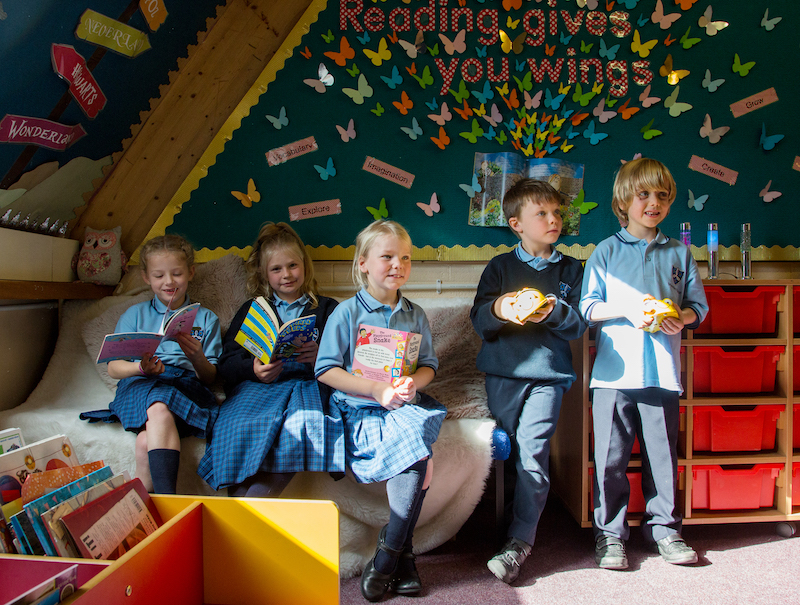The importance of reading
Posted on 8th Apr 2019 in School News, Prep Schools Guide

Catherine Ford, Head of Moreton First, explains how literacy skills are fostered and cherished...
The ringing of bells has marked momentous events throughout history. Whether the gentle sound of just one bell or the majesty of a whole peal, it can be traced through our country’s heritage. They call us to wake, to pray, to work, to arms, to feast and in times of crisis, to come together. Above all, bells mark a time of celebration.
How fitting then that at Moreton First when a child moves on to a new reading level they are invited to ring a handbell. Such events as the acquisition of proficient reading skills are indeed significant occasions. From Early Years when emerging readers realise that the black squiggles on the page form words and meaning right up to when completing the reading scheme a child is declared a ‘Free Reader!’ and beyond. Each stage is worthy of celebration.
Educators have long recognised the cognitive benefits of reading as various parts of the brain work collaboratively, like sections of instruments in an orchestra, to maximize our ability to decode the written text in front of us.
John Stein, Emeritus Professor of Neuroscience at Magdalen College, says reading is far from a passive activity “Reading exercises the whole brain”. Stories allow children to develop the ability to analyse cause, effect and significance of events. As stories have a beginning, middle and end, children’s brains begin to read in sequence.
Reading involves several brain functions, including visual and auditory processes, phonemic awareness, fluency, comprehension, and more. According to the ongoing research at Haskins Laboratories for the Science of the Spoken and Written Word, reading, gives the brain more time to stop, think, process, and imagine the narrative in from of us. This visualization develops the working memory ’muscle’ which we understand is a vital component of academic success.
At the forefront of publications and public concern is a recognised mental health crisis amongst young people. At Moreton First, we offer mindfulness activities and opportunities to address well-being. Included in these opportunities we encourage the children to see our school library as a place of emotional retreat and relaxation.
A new report from The Reading Agency entitled, ‘Literature Review: The impact of reading for pleasure and empowerment’, looks at the impact of reading for pleasure on health and social welfare. Over fifty academic publications were reviewed together with reports from the UK literacy sector, looking at how reading affects health issues such as stress or dementia, or emotional well-being, in four population groups: adults, children and young people, parents and carers, and adults with health needs.
It found that reading for pleasure has a huge impact on children, more than on other age groups. Children will read more thus benefiting emotionally if they have some control over when and where they read. With this in mind, we have encouraged our children to run the Moreton First library themselves, gathering feedback from their peers for requests of new reading material.
Not having to shrug off the mantle of aged school traditions, Moreton First has prided itself in combining the best of traditional practices with exciting initiatives. The way we encourage children to read and to respond to what they have read exemplifies this. In our present educational climate, the debate about the effects of screen time on children continues to rage. Whilst we invest in iPads, tablets and Chromebooks, developing their use in the classroom, we are mindful of balance.
A recent study by Cincinnati Children’s Research Foundation looked at differences in brain activity comparing the times children spent on screens versus reading a book. They used MRI scanning to look at functional brain connectivity between the two activities. They found that brain connectivity is increased by the time children spend reading and decreased by the length of exposure to screen-based media. The conclusion of the study found the importance of reading to support healthy brain development and literacy and limiting screen time. (ACTA Paediatrica, December 2017)
In Moreton First we are very thoughtful in the ways we combine the use of IT skills in Literacy lessons. Here, after reading the story ‘Owl Babies’, Reception Class discussed the main characters and used paint software on the tablets to create owls. Following this, they showed their classmates which character they liked best in the story.
The younger children examine story characters and their motives using the programming language Scratch to code two characters to move and use speech from the story to talk.
We have encouraged the children’s book reviews to be more creative and captivating. Using Tellagami the children regularly create an animated book review. They can add backgrounds, pictures of the book and a 30-second review. Using QR codes of blog book reviews has become a popular way to share children’s work and reading recommendations.
Such skills are developed with older children in Moreton First who use the app Morfo to create interviews with characters from books, thus we are able to embed an understanding of the purpose of print with a growing ability to choose and respond to books in a modern and creative way.
Maybe the simple ringing of small handbell is not enough to celebrate improvement in reading skills? Perhaps it should be replaced with a 12 gun salute! Teaching children to read for enjoyment and the ability to respond to literature in a digital way, we are truly giving each child the key to a balanced future.
This article first appeared in John Catt's Preparatory Schools 2019. You can view this guidebook here: